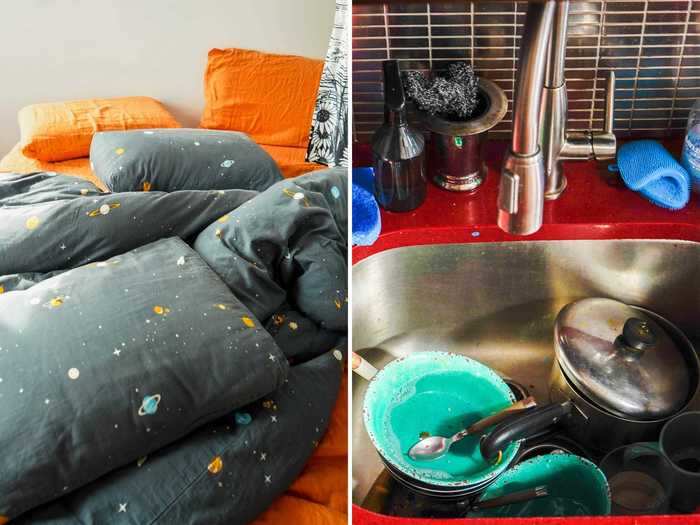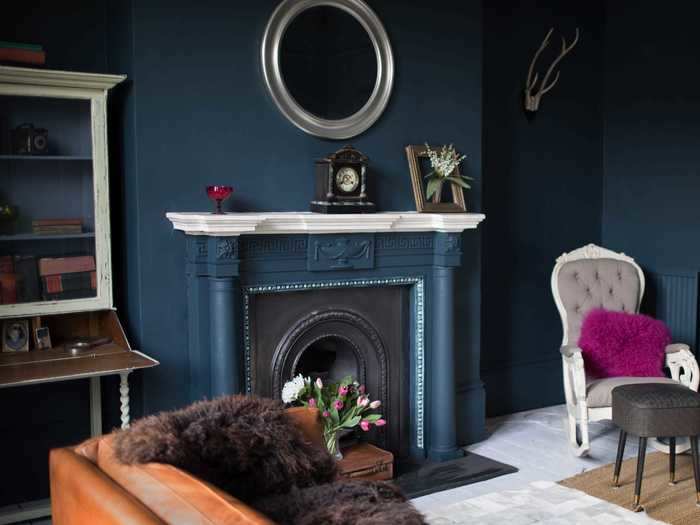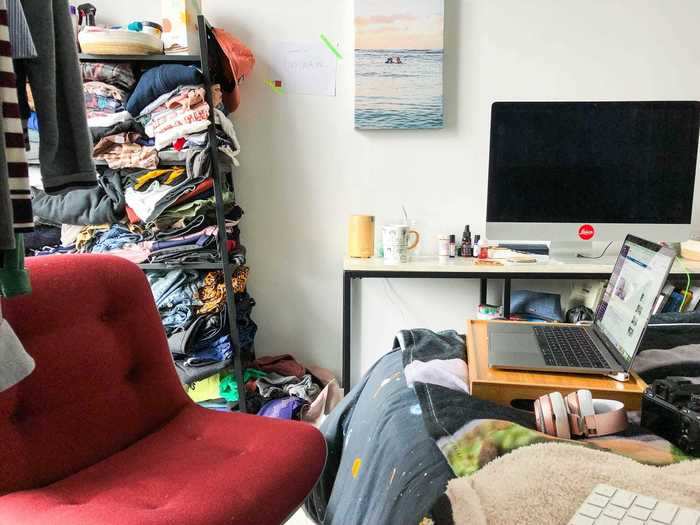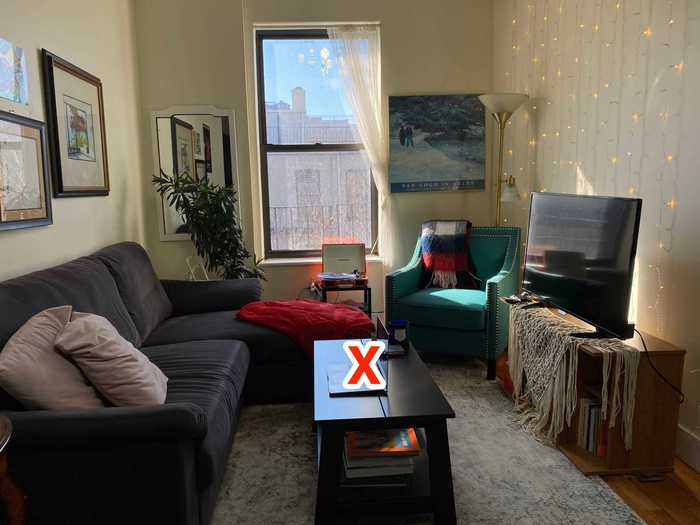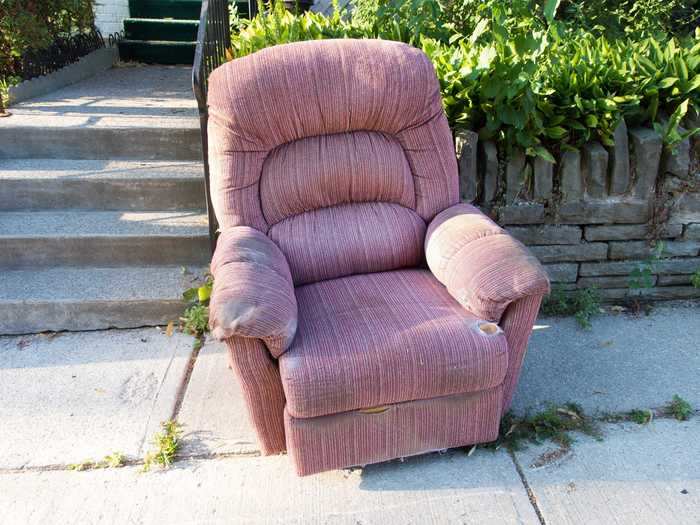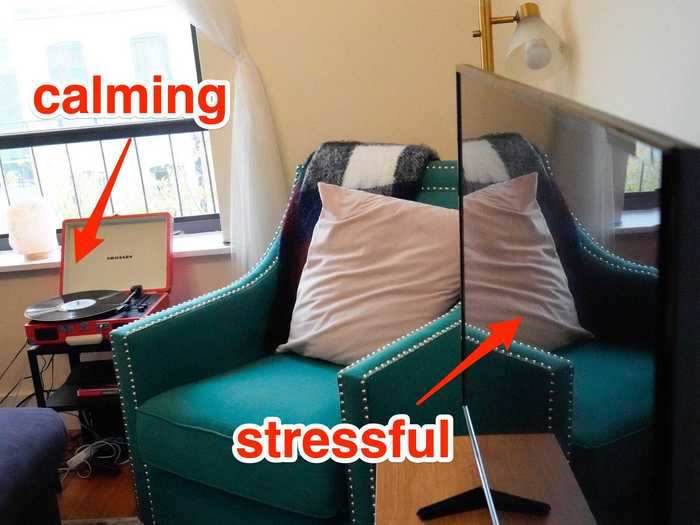Therapists told us about common stressors in our homes, and how to avoid them.Justin Paget/Getty Images
- The ongoing pandemic is stressing people out, but some changes in the home could help combat that.
- Therapists shared six common things that may add to stress in a home, like messes and low light.
- Psychotherapist Cecille Ahrens told Insider our home environment is related to our overall health.
With many people working from home these days, it's natural to pay closer attention to your living space - maybe you find yourself cleaning more often, or you've taken on a decorating project.
Cecille Ahrens, a psychotherapist who hosts a podcast about mental health called "Get Mental" believes there's a relationship between your environment and your overall health.
"Certain items and elements can create stress and cause our bodies to tense up and contract," Ahrens told Insider.
We asked Ahrens and therapists Weena Cullins and Ariel Sank what can cause stress in a home, and they highlighted six standout common stress-inducers - noting that what's stressful to some may not be to others.
Messes can induce stress, and they come in many forms.
An unmade bed and a sink full of dishes.
Joey Hadden/Insider
Disorganization and clutter — like unmade beds and piled-up dishes — typically induce stress, according to psychotherapist Cecille Ahrens.
Therapist Mark Loewen therapist and founder of Launchpad Counseling, previously told Insider that clutter gives our minds more visual information to process.
"By freeing up space, you are giving your mind a break, too," he said.
This is why Ahrens keeps clutter minimal in her own home, and says she gets rid of "things that are broken or no longer serving me or bringing value to my life."
Therapist Weena Cullins told Insider that clutter can increase anxiety around cleaning or maintaining a home.
"Despite our best efforts to keep things clean and organized, if we don't have storage space for things like extra linen, paperwork, toys, or other odds and ends, they will continue to be left out," she said.
Dark colors can make people feel down.
A room with navy walls.
nicolamargaret/Getty Images
"From a mental health perspective, I think dark colors can negatively impact our mood and sense of well-being," Ahrens said.
Ahrens added that how color associations are developed and affect human psychology and behavior is still unclear.
"While the research on color psychology is mixed, it appears depression is helped by white and green light," she said. A 2005 study by BMC Psychiatry backs this.
In her home, Ahrens uses neutral tones and sunlight to keep calm and centered.
"I take advantage of as much natural light in my living space and open windows and doors for fresh air whenever it is weather-permitting," Ahrens said.
Cullins added that rooms with insufficient light can make certain tasks hard to accomplish, while rooms with bright artificial lighting that can't be dimmed can make sleeping and relaxing difficult.
"It's important to consider the function of each room in your home and purchase lighting that helps achieve its purpose," Cullins said. "Adding lamps, wall sconces, dimmers, or ceiling lights can help redefine a space that promotes stress."
Living in a cramped space can induce stress and anxiety.
A cramped workspace inside a bedroom.
Joey Hadden/Business Insider
The layout of a home is a key factor in managing stress.
"Open spaces can be more inviting and may put us in a more expansive state," Ahrens said. "Tight spaces, especially if without a window, can create anxiety and trigger a panic attack."
Ahrens added that in less severe cases, people in confined spaces may experience milder physiological effects like stress, overwhelm, and difficulty concentrating.
If you live in a space without a window, therapist Ariel Sank suggests going outside to boost your mood.
"I always recommend people spend a little bit of time each day, even if it's only for a couple of minutes in direct sunlight in order to de-stress," Sank told Insider.
Working and relaxing in the same space can cause you to feel stressed out.
Therapists do not recommend working and relaxing in the same area of your home.
Joey Hadden/Insider
"During this past year when many people were working from home, it became very difficult for people to separate work from their personal life," Sank said. "By creating a separate area where you work versus relax, you are not only creating a physical separation but a mental separation from the two."
Sank added that separating your work and chill environments can be tough when living in a small space.
"Even changing up the chair or table you sit in to work vs. relax can make a big difference," she said.
Anything outdated or run-down in the home may prompt feelings of stress.
An old chair that was kicked to the curb.
LongHa2006/Getty Images
"Outdated decor or run-down furniture can bring down our spirits," Ahrens said. "When we are surrounded by things that do not feel inviting or soothing or invokes some kind of a stress response, we tend to spend much less time in that space."
For example, Ahrens said a run-down dining table might keep you from eating in that space often.
"If your living-room couch is old, dirty, or outdated, you may not feel as relaxed being in that space," Ahrens said.
Certain common household sounds may induce stress, like background conversations and what's on TV.
A TV may cause stress while calming music may not.
Joey Hadden/Insider
Noise is a common stressor, Ahrens said, and it comes in many forms, from the TV to ongoing conversations.
"Not all noise is unpleasant or stressful, the idea here is to be more mindful of the quality and quantity," Ahrens said.
Loewen suggests turning off the TV when you're not watching, and paying attention to how the noise of the TV makes you feel, especially while watching the news."
If it makes you feel stressed, Loewen recommends swapping out TV for calming music.

